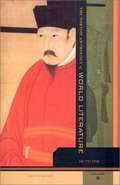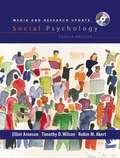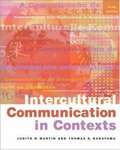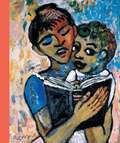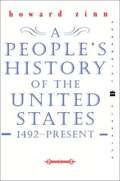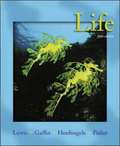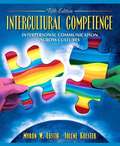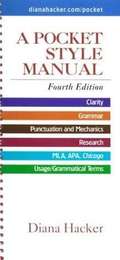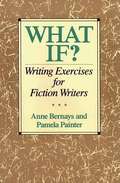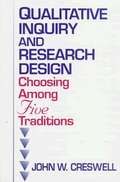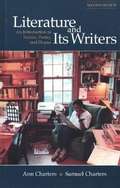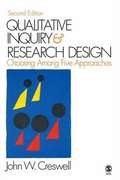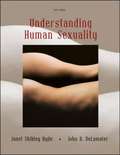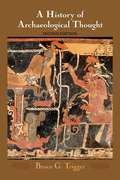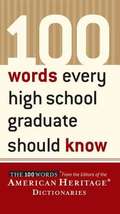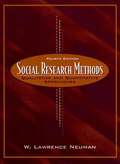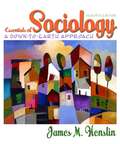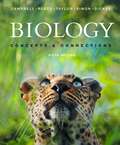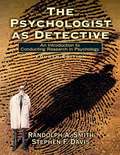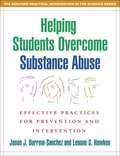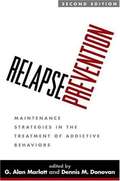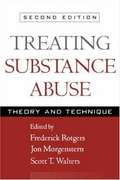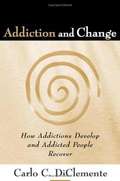- Table View
- List View
Men in Arms: A History of Warfare and Its Interrelationships with Western Society
by Sydney F. Wise Richard A. PrestonTextbook in military history traces the development of warfare and relates it to the development of Western society. This edition (fourth, 1979) revises previous editions and updates the text to 1990.
The Norton Anthology of World Literature, Volume B: 100 to 1500 (2nd Edition)
by Sarah LawallSelections from Africa, Europe, Japan etc.
Social Psychology: Media and Research Update (4th Edition)
by Elliot Aronson Timothy Wilson Robin MakertArticles on Social psychology
Intercultural Communication in Contexts (3rd edition)
by Judith N. Martin Thomas K. NakayamaAn in-depth look at the cultural context of communicating both with silence and speech.
The Developing Person Through Childhood & Adolescence
by Kathleen Stassen BergerEdition after edition, Kathleen Stassen Berger's The Developing Person Through Childhood and Adolescence re-emerges as the ideal textbook for the chronologically-organized development course--a perennial bestseller that always provides an authoritative portrait of the field, carefully crafted learning tools, and a narrative style and emphasis on cultural contexts that make the material relevant to its broad student audience.
A People's History of the United States: 1492-Present
by Howard ZinnA history of the United States.
Life, 5th edition
by Bruce Parker Marielle Hoefnagels Douglas Gaffin Ricki LewisIntroduction to Biology textbook.
Intercultural Competence: Interpersonal Communication Across Cultures (5th edition)
by Myron W. Lustig Jolene Koester"In this second half of the first decade of the twenty-first century, the world is vastly different from what it was a generation ago, or a decade ago, or even a few years ago. Technological innovations in communication, transportation, and various information tools have helped to create the greatest mixing of cultures that the world has ever seen. More than ever before, competence in intercultural communication is required for you to function well in your private and public lives; there is a very strong imperative for you to learn to communicate with people whose cultural heritage makes them very different from you. Our goal in this book is to give you the knowledge, motivation, and skills to accomplish that objective. ... The material we include in this book is guided as well by our strong belief that a textbook on intercultural communication needs to provide a healthy blend of the practical and the theoretical, of the concrete and the abstract."
What If? Writing Exercises for Fiction Writers (1st edition)
by Anne Bernays Pamela PainterA handbook for writers based on the idea that specific exercises are one of the most useful and provocative methods of mastering the art of fiction writing
Qualitative Inquiry and Research Design: Choosing among Five Traditions (1st edition)
by John W. CreswellAn explanation of five approaches to qualitative research.
Literature and Its Writers: An Introduction to Fiction, Poetry, and Drama
by Ann Charters Samuel ChartersA compilation of fiction, poetry and drama. The book discusses these works and aspects of reading and writing.
Qualitative Inquiry and Research Design: Choosing among Five Approaches (2nd edition)
by John W. CreswellMany changes have occurred on the landscape of qualitative research, and these changes and my thinking about them are reflected in this second edition.
Understanding Human Sexuality, Ninth Edition
by Janet Shibley Hyde John D. DelamaterThis trusted text examines the biological, psychological, and social science of human sexuality, provides practical information needed for everyday living, and familiarizes students with research methods used in sexuality. The author team features a unique combination of a psychologist and a sociologist, which gives this text a distinct interdisciplinary perspective.
A History of Archaeological Thought (2nd Edition)
by Bruce G. TriggerTextbook that describes theories in archaeology for the last two centuries.
100 Words Every High School Graduate Should Know
by The Editors of the American Heritage DictionariesIn addition to carefully choosing a well-balanced mix of terms from A to Z, the book balances straightforward vocabulary entries, such as bellicose, loquacious, and vehement, with words chosen directly from the disciplines of learning, such as parabola and hypotenuse from mathematics, gerrymander and enfranchise from civics, and photosynthesis and hemoglobin from biology. As a result, students often have an easier time with the list than adults, especially if they've been paying attention in their classes! The book also offers exercises at the end of the text to assist in the incorporation of the words into one's active vocabulary.
Social Research Methods: Qualitative and Quantitative Approaches (4th edition)
by W. Lawrence NeumanThis book offers students balanced coverage of both the qualitative and quantitative approaches to social research. It teaches them to guard against ethnocentric perspectives and confining their research on the assumptions of their own society.
Essentials of Sociology: A Down-To-Earth Approach (7th edition)
by James M. HenslinThis textbook explores the behavior of social groups, examines the impact of culture and social inequality on everyday lives, describes political and religious institutions, and analyzes population and technology trends. The functionalist, symbolic interactionist, and conflict perspectives are represented in most chapters. The sixth edition adds three photo essays, and reflects some national and global changes. Annotation ©2004 Book News, Inc., Portland, OR (booknews.com)
Campbell Biology: Concepts and Connections (6th edition)
by Neil A. Campbell Jane B. Reece Martha R. Taylor Eric J. Simon Jean L. DickeyThe aim of this book is to engage students from a wide variety of majors in the wonders of the living world. In this sixth edition the emphasis is on connections to our everyday world while also doing more to help students connect the concepts of biology to evolution.
The Psychologist as Detective: An Introduction to Conducting Research in Psychology (Fourth Edition)
by Randolph A. Smith Stephen F. DavisThe Psychologist as Detective conveys the excitement of research methodology through a lively, conversational style. To make the study of the research process interactive and accessible for readers, pedagogical features and critical thinking activities are integrated throughout the volume. Actual student research appears in each chapter to increase relevance and heighten reader interest. This text evaluates the science of psychology, research ideas and hypotheses, ethics, nonexperimental methods and the basics of experimentation variables and control, statistics, designing-conducting-analyzing and interpreting experiments, as well as alternative research designs, external validity, critiquing experimental research and writing and assembling an APA-format research report. For individuals involved with or interested in psychological research.
Helping Students Overcome Substance Abuse: Effective Practices for Prevention and Intervention
by Leanne S. Hawken Jason J. Burrow-SanchezTwo professors at the University of Utah explore adolescent substance abuse prevalence, assessment, prevention, group interventions, individual interventions, and the referral process. Intended for school mental health professionals, the guide outlines the major substances of abuse, the steps in the screening process, research-based prevention programs, the developmental stages of therapy groups, and an action plan for community-based services. Annotation ©2007 Book News, Inc., Portland, OR (booknews.com)
Relapse Prevention: Maintenance Strategies in the Treatment of Addictive Behaviors (Second Edition)
by Dennis M. Donovan G. Alan MarlattGrounded in research and illustrated with clinical vignettes, these papers demonstrate various ways to help people maintain abstinence or harm reduction treatment goals and to handle setbacks. They review such therapeutic techniques as cognitive restructuring, imagery, relapse rehearsal, and mindfulness meditation. This second edition features new coverage of stimulants, opiates, cannabis, "club drugs," gambling, and sexually risky behaviors. A new chapters addresses ethnocultural issues in relapse prevention. Annotation ©2005 Book News, Inc., Portland, OR (booknews.com)
Treating Substance Abuse (2nd Edition)
by Scott T. Walters Jonathan Morgenstern Frederick RotgersPresented to aid non-physicians in substance abuse treatment, 12 revised chapters offer discussions of theory and clinical practice in six major approaches to treatment: Alcoholics Anonymous 12-step, psychodynamic, marital/family, cognitive-behavioral, contingency management, and motivational approaches. After the paired theoretical/clinical chapters, two final contributions discuss pharmacotherapy and issues of integrating theory, research, and practice. Annotation ©2004 Book News, Inc., Portland, OR (booknews.com)
Introduction to Economic Analysis
by R. Preston McafeeThis book presents introductory economics ("principles") material using standard mathematical tools, including calculus. It is designed for a relatively sophisticated undergraduate who has not taken a basic university course in economics. It also contains the standard intermediate microeconomics material and some material that ought to be standard but is not. The book can easily serve as an intermediate microeconomics text. The focus of this book is on the conceptual tools and not on fluff. Most microeconomics texts are mostly fluff and the fluff market is exceedingly over-served by $100+ texts. In contrast, this book reflects the approach actually adopted by the majority of economists for understanding economic activity. There are lots of models and equations and no pictures of economists.
Addiction and Change: How Addictions Develop and Addicted People Recover
by Carlo C. DiclementeDiClemente (psychology, University of Maryland) views addiction as a process of intentional behavior change, and defines the four steps in his transtheoretical model: contemplation, preparation, action, and maintenance. He then proposes that the same process marks the path to addiction as it does for recovery, and suggest ways to tailor interventions to persons at different points in the change process. Annotation (c)2003 Book News, Inc., Portland, OR (booknews.com)

